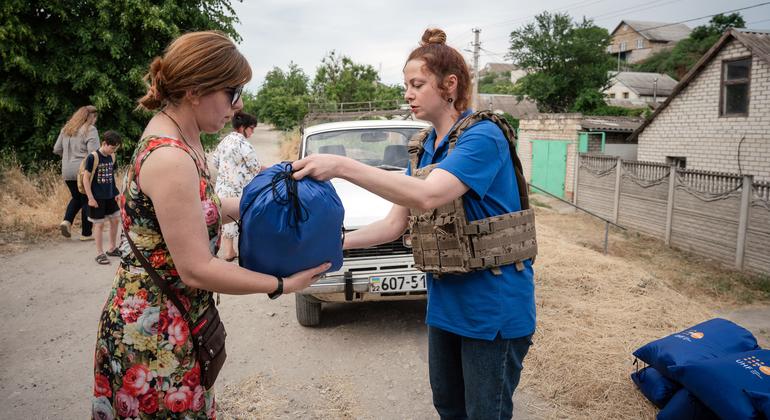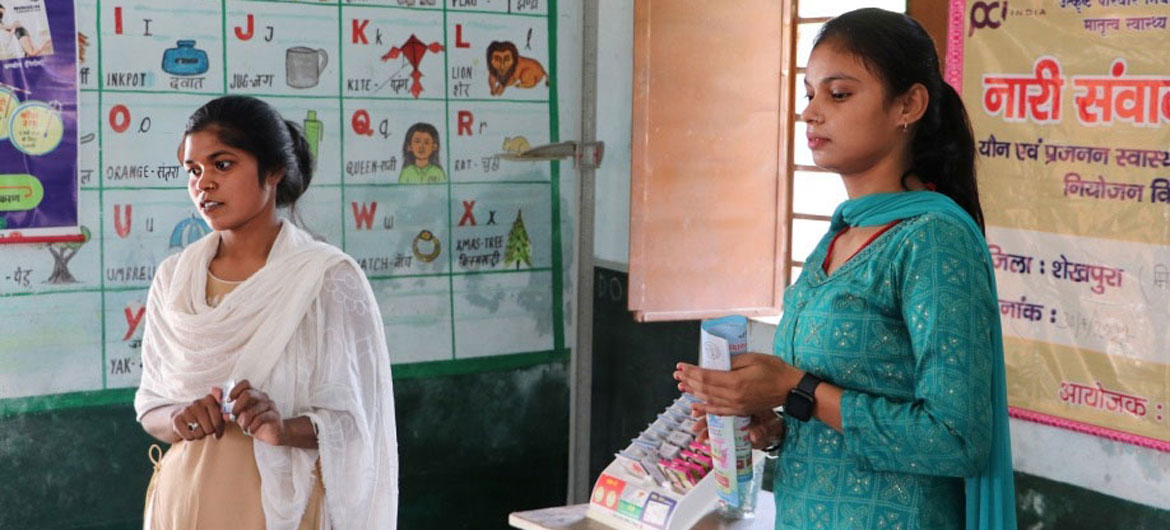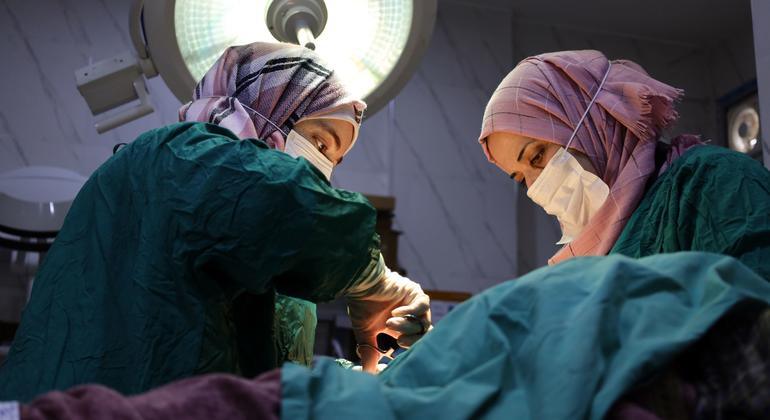“I will never allow my daughter to go through what happened to me,” she told UNFPA, the United Nations Sexual and Reproductive Health Agency.
What happens when the conflict moves tens of thousands of people in hotspots like Nigeria, the Democratic Republic of Congo (DRC) and Ukraine, and women die every day in childbirth or pregnancy ?
The UNFPA is there, equipping travel camps and medical staff with life -style supplies.
When an earthquake is full of the city’s blocks, it puts contraceptives on emergency emergency convoys alongside kits to deliver babies and drugs to stop internal bleeding.
When a cyclone cuts through remote island communities, the agency sends contraceptives just as it sends sterile medical equipment, including condoms, oral and injectable contraceptives, contraceptive implants and intrauterine devices (DIU) .
For what? Because contraceptives are part of vital humanitarian care.
This can be counter-intuitive for some, but it is a fact established in the eyes of medical science, humanitarian workers and women themselves.
Even outside of emergency environments, having access to modern and safe contraceptives allows women to make their own decisions concerning their fertility, which in turn reduces involuntary pregnancies and dangerous abortions, improves health results and reduces the risk of maternal and infantile mortality.
In short, family planning saves millions of lives. Here are some of the reasons for which:
A woman is injected with a contraceptive in a health center supported by UNFPA in the Central African Republic.
Getting pregnant does not stop in an emergency
It is estimated that more than 60% of all maternal deaths take place in humanitarian crises and fragile parameters, places where women find it difficult to access the care and nutrition necessary to bring a safe pregnancy.
Even in the best circumstances, the alarming proportions of women are unable to say no to sex, about a quarter of women, according to the most recent data.
In a humanitarian crisis, women experience about double sexist violence rates as well as the increased risk of rape as war and genocide tool and the increased risk of violence between intimate partners. All this raises their vulnerability to an unwanted pregnancy.

Prevent fatal complications
Although contraception is sometimes criticized – wrongly – as a new drug, which is unnatural or misunderstood, the truth is that they have existed for millennia. Condoms, for example, have been used for centuries.
With regard to modern forms of contraception, they are among the most prescribed and most studied drugs. The contraceptives have been studied not only by pharmacologists and medical researchers, but also by health economists, epidemiologists and decision -makers, and the results are conclusive: by preventing involuntary pregnancy, contraceptives prevent women from dying .
How? Each pregnancy has a risk and pregnancies in crisis environments, where health systems are in tatters and rare medical care, are particularly dangerous.
Vital help because babies do not wait
What happens when a woman is ready to give birth after a hurricane or in a war zone?
In the DRC to the crisis, a rupture in health infrastructure led maternal mortality rates to soar, with three women who die every hour of pregnancy or delivery complications.
“Many women from northwest Syria lose life while being transferred between hospitals in the absence of essential supplies in critical conditions,” Dr. Ikram Haboush told Idlib.
Unwanted pregnancies are also directly correlated with higher maternal mortality rates.
“This is why each public health program designed to reduce the number of maternal deaths incorporates contraception as one of the pillars of action”, according to experts who wrote the annual flagship publication of UNFPA, the report of the population of the state of the world, by seeing the invisible: the case of action in the neglected crisis of unwanted pregnancy.
By preventing involuntary pregnancy, contraceptives also reduce the incidence of maternal injuries and diseases, mortincy and neonatal death.
In 2023, the UNFPA dedicated supplies partnership obtained a value of $ 136 million in contraceptives, which would have prevented nearly 10 million involuntary pregnancies and more than 200,000 maternal and newborns. It is estimated that these contraceptives also prevented nearly three million dangerous abortions.

Two community workers provide information on Bihar’s contraceptives in India.
Prevention of deadly diseases, chronic diseases
Contraceptives such as male and female condoms also save lives by reducing the chances of contracting sexually transmitted infections (IST), including HIV.
Even a treatable IST can be fatal in environments with limited access to medical care, as is the case for women and girls in Haiti, for example, where generalized and relentless sexual violence has led to an increase in rates unintentional pregnancy as well as STIs, while the health system has practically collapsed.
About three percent of survivors in Haiti declare that you receive post-viole treatment within 72 hours of attack. This treatment includes emergency contraception to prevent pregnancy and post-exposure prophylaxis to prevent HIV transmission.
The contraceptives also deal with affections unrelated to sexual activity which are debilitating in even stable and secure circumstances such as polycystic ovarian syndrome, endometriosis, dysmenorrhea and extremely heavy bleeding.
For women like Omaira Opikuko from Venezuela, there is no doubt that long -term contraception after her sixth delivery has saved lives.
She suffered from both hemorrhage and a speechless uterus during her last work.
“I was on the verge of death,” she said.

Two students from the Thai high school for Thai educators describe a range of available condoms.
Profitable humanitarian interventions
Family planning is profitable.
In 2023, more than 50 countries that received contraceptive supplies from UNFPA carried out collective savings of more than $ 700 million thanks to reduced health costs for pregnancy, childbirth and post-avoort care.
Many studies have shown that family planning is an essential investment for society, not only by avoiding involuntary pregnancies and maternal health problems that accompany it, but also by increasing education and employment gains in women.
In humanitarian circles, contraceptives are all the more critical, helping women and families to survive and stabilize and leave them better prepared to recover.
No one knows it better than survivors of humanitarian crises themselves
“There is a lot of request for family planning services,” said an emergency worker the day after a deadly cyclone.
In the middle of the growing precariousness of the world, the increase in disasters and increasing movements, these services are a light in the dark for women and girls around the world.
As Ms. Opikuko said in Venezuela: “I don’t want to be afraid.”
Learn more about UNFPA here.




